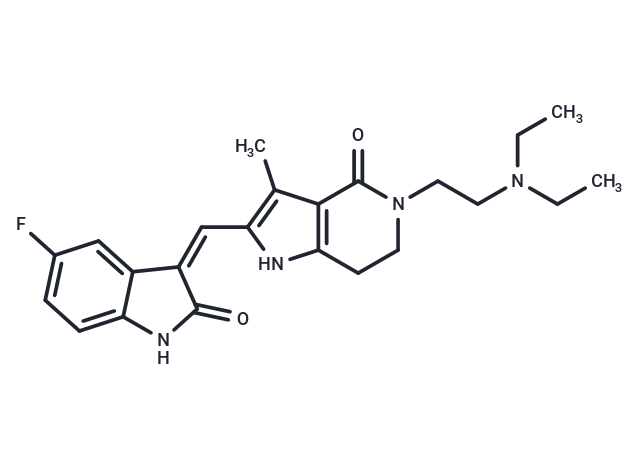Shopping Cart
- Remove All
 Your shopping cart is currently empty
Your shopping cart is currently empty

Famitinib (SHR1020) is a potent orally active multi-targeted kinase inhibitor that effectively inhibits the activity of c-kit, VEGFR-2, and PDGFRβ with IC50 values of 2.3 nM, 4.7 nM, and 6.6 nM, respectively [1]. It demonstrates remarkable antitumor properties in human gastric cancer cells and xenografts, inducing apoptosis [2].

| Pack Size | Price | Availability | Quantity |
|---|---|---|---|
| 25 mg | $1,970 | 6-8 weeks | |
| 50 mg | $2,570 | 6-8 weeks |
| Description | Famitinib (SHR1020) is a potent orally active multi-targeted kinase inhibitor that effectively inhibits the activity of c-kit, VEGFR-2, and PDGFRβ with IC50 values of 2.3 nM, 4.7 nM, and 6.6 nM, respectively [1]. It demonstrates remarkable antitumor properties in human gastric cancer cells and xenografts, inducing apoptosis [2]. |
| In vitro | Famitinib inhibits the VEGF-induced proliferation, migration and tubule formation of human umbilical vein endothelial cells, as well as micro-vessel spouting from matrigel-embedded rat aortic rings [1]. Famitinib inhibits cell proliferation by inducing cell cycle arrest at the G2/M phase and causes cell apoptosis in a dose-dependent manner in gastric cancer cell lines. Famitinib (0.6-20.0 μM) inhibits gastric cancer cell growth in a dose-dependent manner [2]. Cell Proliferation Assay [3] Cell Line: Human gastric cancer cells BGC-823 and MGC-803 Concentration: 0, 0.6, 1.25, 2.5, 5.0, 10.0 and 20.0 μM Incubation Time: 24, 48 and 72 hours Result: Inhibited cell growth in a dose-dependent manner. The IC 50 values in BGC-823 and MGC-803 cells were 3.6 and 3.1 μM, respectively. |
| In vivo | Famitinib exerts broad and potent anti-tumor activity, leading to regression or growth arrest of various established xenografts derived from human tumor cell lines [1]. Famitinib significantly slows tumor growth in vivo via inhibition of angiogenesis in BGC-823 xenograft models. Famitinib (50 and 100 mg/kg;gavage) reduces xenograft growth in vivo via inhibition of angiogenesis [2]. Animal Model: 18-20 g female BALB/c athymic nu/nu mice (age, 6–8 weeks) bearing BGC-823 xenografts [4] Dosage: 50 and 100 mg/kg Administration: Gavage, once daily for 3 weeks Result: Both doses exerted a similar inhibitory power, but greater toxicity was observed. Inhibited BGC-823 xenograft growth (tumor volume, 395.2 vs. 2,690.5 mm 3 ), and animal weights were similar between groups (21.6 vs. 18.7 g). |
| Molecular Weight | 410.48 |
| Formula | C23H27FN4O2 |
| Cas No. | 1044040-56-3 |
| Storage | Powder: -20°C for 3 years | In solvent: -80°C for 1 year | Shipping with blue ice. |

Copyright © 2015-2025 TargetMol Chemicals Inc. All Rights Reserved.